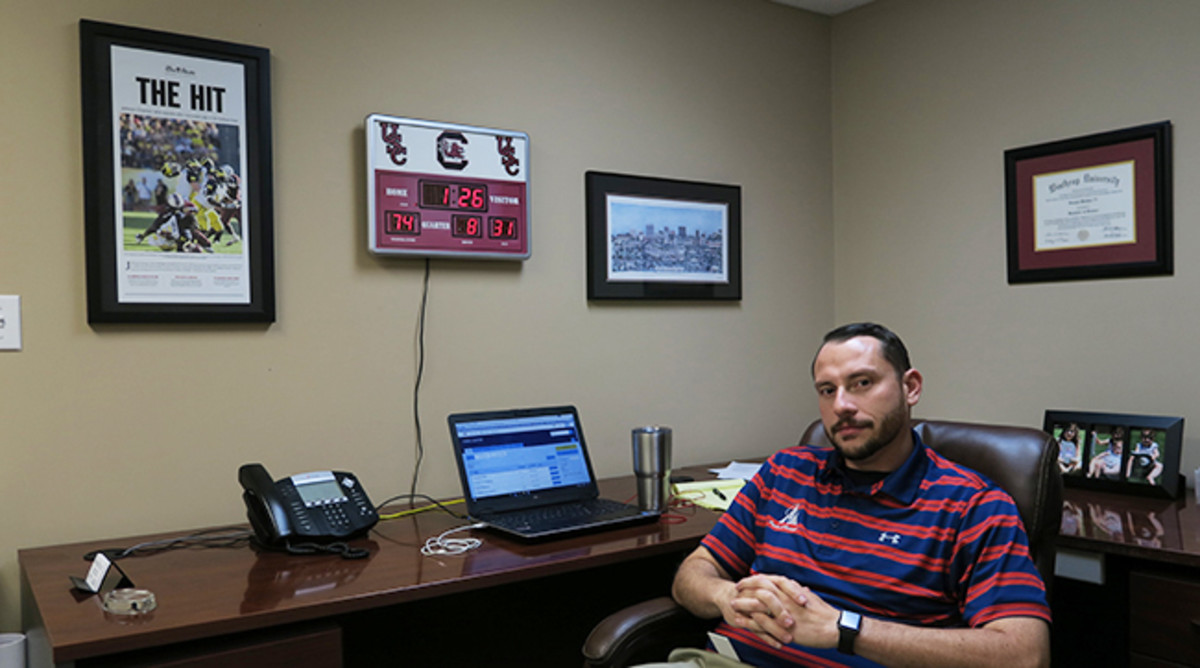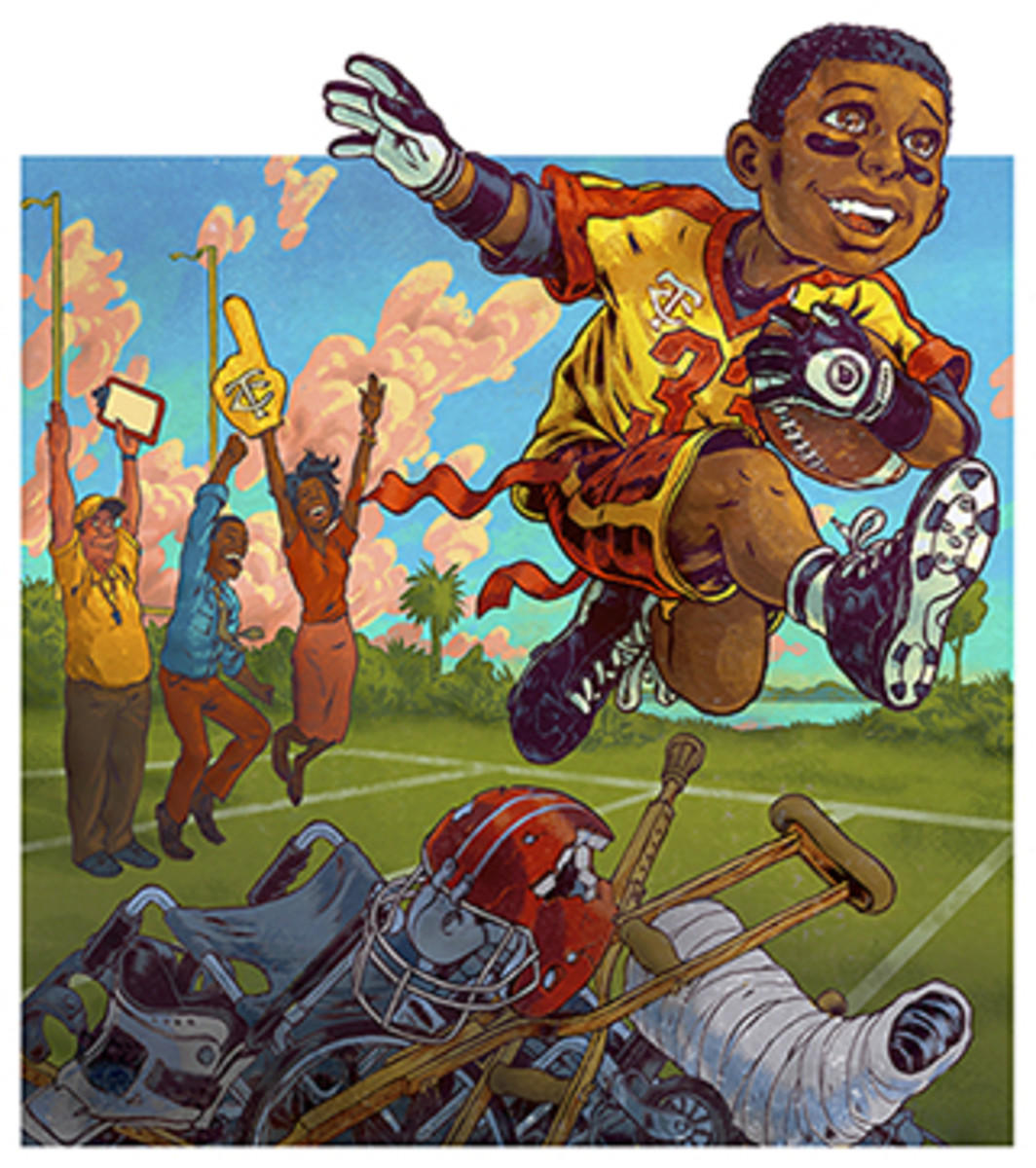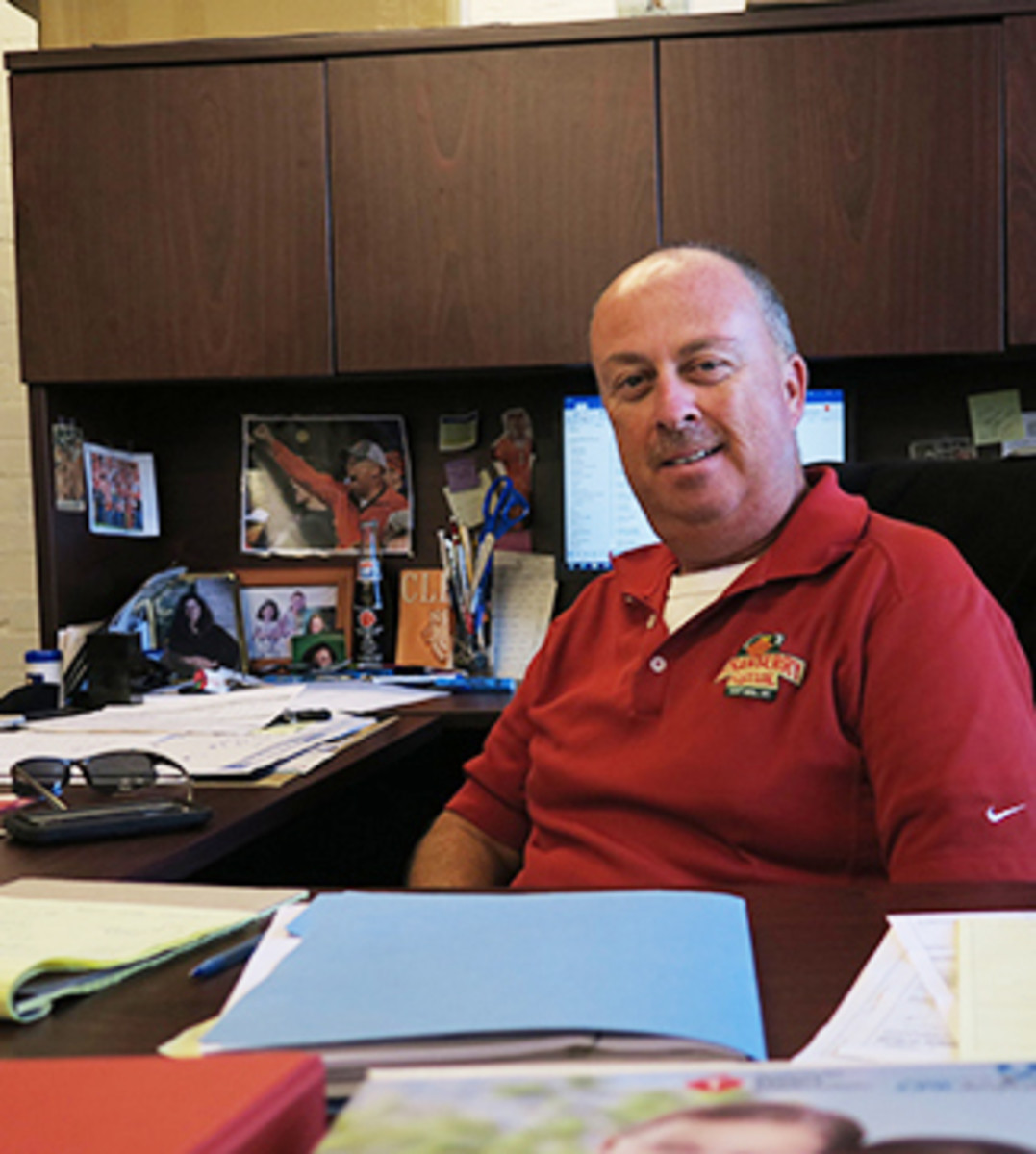The Town That Doesn't Tackle

Editor’s Note: Peter King and the staff of The MMQB took over the Sept. 19 issue of Sports Illustrated magazine. In it, you’ll read the kind of feature stories that you’ve come to expect from The MMQB, plus an all-access behind-the-scenes look at one day in the life of the NFL, from inside the Texans’ team meeting on the night before the season opener to the Patriots’ celebrations at the end of their surprise win in Arizona, and much more. Pick up the magazine on newsstands, or subscribe here.
The main wall of Joey Blethen’s office is decorated with a large, framed newspaper cover of former South Carolina Gamecock Jadeveon Clowney’s famous 2013 Outback Bowl hit, the one so violent that it knocked Michigan running back Vincent Smith’s helmet off. Visitors would never guess that Blethen, the parks and rec director of Tega Cay, S.C., is the man who eliminated tackle football for kids age seven to 12 in this upper-middle-class Charlotte suburb. “I am the exact complete opposite of a person that you would think would make this decision,” Blethen, a former high school player and coach said this summer. “But it’s not about me.”
The impetus for the decision arose last November when Blethen saw an ABC news report about the 11 high school football players across the country who died in 2015 (four from head trauma). “I asked myself a question,” said Blethen. “Could I live with myself if a participant in our tackle football program were to become seriously injured, paralyzed or even worse?”
“Could I live with myself if a participant in our tackle football program were to become seriously injured, paralyzed or even worse?”
Starting this year kids from five through 11 can only play flag football in the town league, although school teams for seventh-graders and up play tackle. It was an emotional choice, but one the community had already begun to make on its own. The demand for flag football in Tega Cay has grown. Over the last four years Blethen has expanded the flag program from one age group and one fall season to three age groups (six-and-under, eight-and-under, 11-and-under) with fall, spring and summer seasons. And participation jumped from 195 players in 2015 to 284 this year. Meanwhile, tackle football peaked at 150 participants in ’13 and was down to 103 last fall. To Blethen, the growth in flag from last year suggests there hasn’t been a mass exodus to join tackle programs in neighboring towns such as Fort Mill or Rock Hill, the latter a football hotbed that has seen 11 players, including Clowney, drafted into the NFL since 2002.

Tega Cay is in step with national youth football trends. According to the 2016 USA Football Participation Survey, flag football was the fastest-growing sport from 2014 to ’15 among children age six to 14. Participation grew 8.7%, while tackle football participation increased 1.9%.
“It means that football has a brighter future,” said Chris Nowinski, cofounder of the Concussion Legacy Foundation. “People are understanding the research and making appropriate moves. There is no downside to postponing the introduction to tackle football.”
I9 Sports, a youth sports provider with franchises in 29 states, including football-rabid Florida, Ohio, Michigan and Texas, has seen a 46% growth in participation in its flag program over the past five years and a 12% increase from 2014 to ’15. Flag football is the most popular sport the company offers.
Even the NFL sponsors youth flag football leagues across the country; its NFL Flag program has more than 350,000 participants age five to 15. It’s one of three youth-sports programs the league lends its name to.

Greg Baer’s son Braden plays on a Tega Cay 11-and-under flag team. Baer, 41, played guard and center at Western Carolina, an FCS program. He coached Braden in Tega Cay tackle for one season when Braden was nine. But Greg didn’t feel comfortable with the physicality, and he put Braden back in flag the following year. “Even at that young age, the collisions are a lot harder than I thought they would be,” Baer said, watching from a lawn chair as his son, now 11, practiced. Baer doesn’t plan on putting Braden back in tackle until seventh grade, or maybe even high school. “He was bummed about it,” Baer said, “but at this age I just don’t think hitting is necessary. As long as he learns the fundamentals of the game now, the tackling stuff is the easy part to learn.”
Arizona Cardinals safety Deone Bucannon played two years of flag as a kid and still preaches its virtues. “I would recommend that all young kids play flag first, so they can get an idea of how to play the game without worrying about the physical part,” he said in August.
Two lawn chairs down from the elder Baer at the 11U practice sat another football parent. But Amanda Hawkins, watching 10-year-old son Jake, couldn’t have been further from Baer in tackle/flag philosophy. “I’m the only mom I know who wants her kid to play tackle,” Hawkins said. “We are being overly cautious. Life is going to happen.”

Meanwhile, in neighboring Fort Mill, parks and rec director Brown Simpson disagrees with his Tega Cay counterpart. He’s a Clemson football season-ticket holder who thinks tackling is safer than it’s ever been. “I love tackle football on every level,” he said. “We are going to continue it, because we think it is a very important part of the development of an athlete.”
He adds that “concussion awareness and prevention is an emphasis that we try to place on all of our sports.” That emphasis begins with educating coaches. All Fort Mill tackle coaches are certified in USA Football’s Heads Up coaching technique. Stephen Piercy, a Fort Mill tackle coach who joined the program this season said he isn’t concerned about the safety because of the many precautions in place. “Football is as safe a sport as I believe there is,” Piercy said. Piercy is a former Tega Cay tackle coach who moved over to coach in Fort Mill's program after the decision was made.
Neither Simpson nor Blethen has heard of another South Carolina community that has eliminated its tackle program. “I just stepped out on a limb,” Blethen acknowledged. He understands the hesitation to put limits on America’s most popular sport, but he hopes it will spread. “If anyone’s been having thoughts about eliminating their tackle football program, there are others that have had the same thoughts,” Blethen said. “And they have actually acted on it.”
• Question? Comment? Let us know at talkback@themmqb.com
